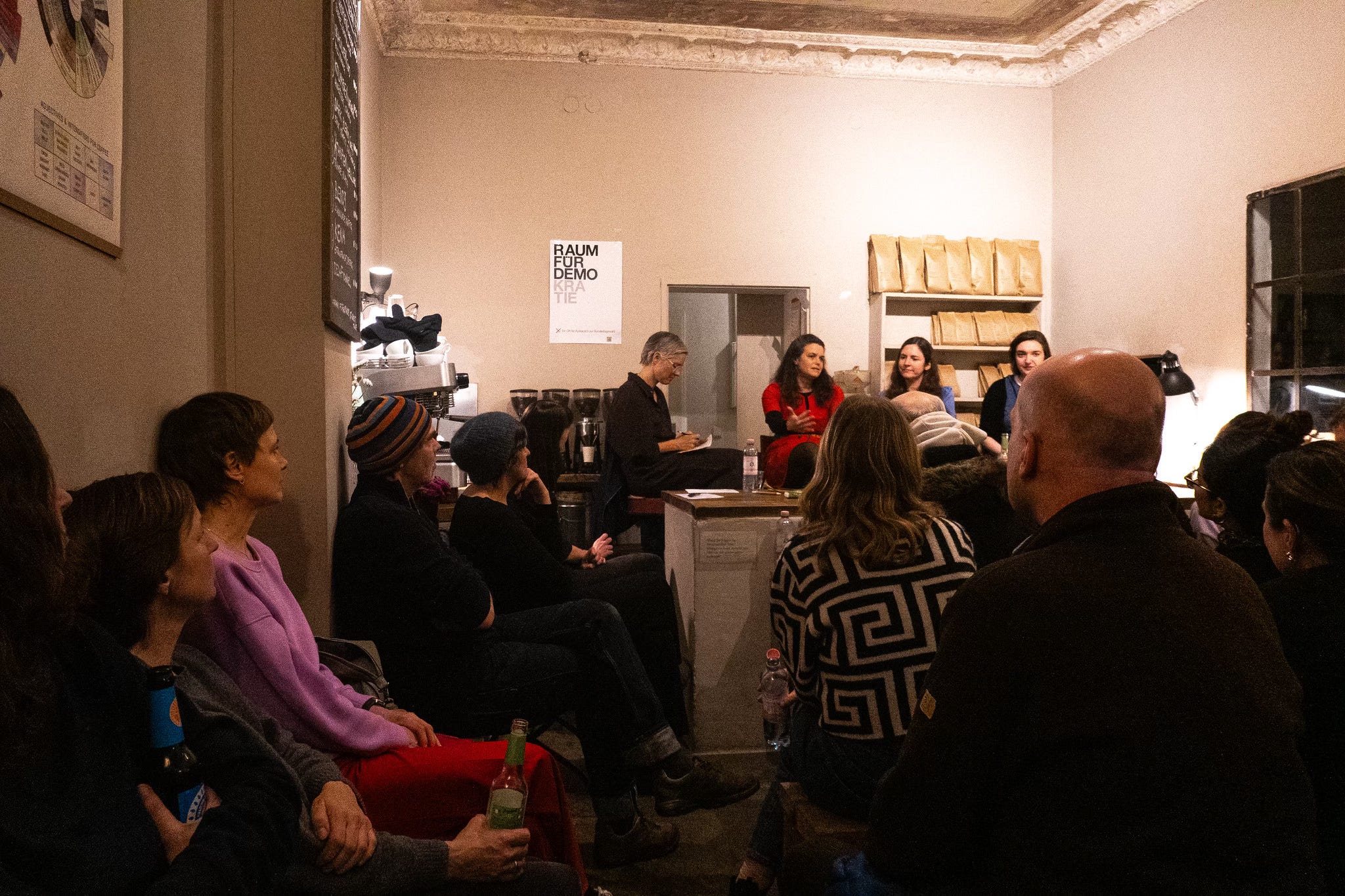Photog: Good Morning, Economist.
Econ: Good Morning, Photographer.
Photog: I have attended a panel discussion about women in politics.
Econ: You even brought a photo.
Photog: I am a photographer.
Econ: Why did you go to the event? Our equality discussion from yesterday brought you, right?
Photog: Dream on. Anyway, three female politicians from three different parties discussed why in the current German Bundestag, less than a third of the members are women. Why politics, in general, is still a male domain.
Econ: Why?
Photog: Because women still do most of the care work, they lack what is most needed for a political career: time. They also lack positive role models and women who can bring other women into politics. They also lack money. In summary, parliament is a reflection of society. Women suffer disadvantages.
Econ: What can be done to increase equality in politics?
Photog: Quotas are the only instrument that can quickly and effectively change the situation. In the Green Party, Bündnis 90 / Die Grünen, for example, every second political seat must be held by a woman. The other half of the seats are open to everyone.
Econ: The other half is also open to women?
Photog: Yes.
Econ: So, over half of the Green Party's political mandates go to women?
Photog: Almost two-thirds of the Green Party members in the newly elected German Bundestag are women.
Econ: I like that.
Photog: But do you also like the rule behind that, the quota? You're such a big fan of individual freedom, aren’t you? Doesn't the quota contradict this idea? After all, it excludes people from holding a position, right?
Econ: That's true. If you look at the situation at the micro level, a quota is unfair. It prevents equal treatment. A woman gets a position because she is a woman. Men have no chance. But there's a second perspective, the macro level: if women are prevented from obtaining political mandates for structural reasons, these structural causes must be contradicted. Otherwise, there can be no equality.
Photog: And a quota can do that?
Econ: It was you who said that it is the most effective tool.
Photog: So you think the quota is excellent.
Econ: I'm in favour of eliminating inequalities. Better childcare. Incentives to ensure care work is more evenly distributed between the sexes. Political processes that don't just reward those who have been in the business for a very long time. We need more of these things that make it easier for woman to join the competition.
Photog: You didn't mention the quota.
Econ: Basically, the quota starts at the wrong end: the outcome. This leads to the previously mentioned injustice on the individual level. It would be better to eliminate the injustice where it arises. The result would be an equal proportion of women in jobs without coercion.
Photog: So you are against a quota.
Econ: Above all, I favour freedom of choice and competition, especially in politics.
Photog: What are you trying to tell me with that?
Econ: That I like as it is in Germany. Some parties have quotas, others don't. As a result, some have more women in politics, others don't. Voters decide who they vote for: the party with a quota and more women or the party with no quota and fewer women.
Photog: And which party do people prefer?
Econ: The party of the presumed next chancellor, Friedrich Merz of the CDU, has a female share of only 22.6 per cent in the Bundestag. My impression of the current debate in Germany is that this is quite embarrassing for the party. It doesn’t help Friedrich Merz.
Photog: Angela Merkel, the only woman to have served as Chancellor so far in Germany, came from Merz’ CDU.
Econ: Yes, that's interesting. Perhaps Merkel's chancellorship contributed more to a different image of women than some progressive women's policies.
Photog: However, she has had little success with this within her party.
Econ: She was the leader of a conservative party. That a woman became its leader was an outrage enough; had she also actively advocated for women's issues, she might not have stayed in power so long.
Photog: And what does that mean for my question: Quota yes or no?
Econ: There are many paths to greater equality. Perhaps a quota is the right path for a more progressive party, while a more conservative one might prefer a path without quotas. This form of diversity has at least one advantage: reactionary developments become less likely. Because whenever new rules apply to everyone, those who oppose them look for ways to reverse the trend.
Photog: You know what?
Econ: What?
Photog: I already suspected I wouldn't get a clear answer to that question.
Econ: And you asked anyway.
Photog: I did. See you tomorrow, Economist.
Econ: See you tomorrow, Photographer.
Related: Germany’s New Parliament Is Sworn In, but Where Are the Women? (New York Times)






Nice dialogue!